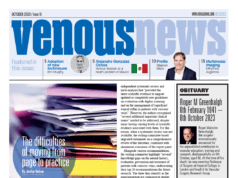
“Expect—and prepare for—the unexpected,” Karen Gibson, Sergeant at Arms at the United States Senate, told the UIP 2023 World Congress (Sept. 17–21) during a keynote address entitled ‘Leadership in crisis’. In this interview with Venous News, Gibson summarizes some key messages from her talk at the Miami, USA, meeting and shares advice on how to be a good leader in a high-pressure working environment, extolling in particular the benefits of continuous learning.
Gibson has extensive leadership experience dating back to the earliest years of her military career. “I had my first leadership position one year out of college,” she tells this newspaper. “I was 23 years old and leading 30 people, mostly men, all but two of whom were older than me.” Gibson served in the US Army for 33 years, attaining the rank of Lieutenant General. Subsequently, she served as the Deputy Director of National Intelligence for National Security Partnerships, Director of Intelligence for US Central Command, Director of Intelligence for the multinational task force to defeat ISIS in Iraq and Syria, and Deputy Commanding General for the US Army Cyber Command before taking on her current role at the US Senate.
It was this considerable experience that made Gibson an apt choice for a keynote address on leadership at UIP 2023, and specifically leadership ‘in crisis’. She elaborates on the importance of her key piece of advice from the talk—to expect the unexpected: “Things we have not imagined, along the lines of the global pandemic, are going to happen and be disruptive, and leaders must lead their team through these crises.”
There are certain traits that are key to being a good leader, Gibson opines. “True leadership needs to be authentic,” she says, explaining that, while it is a good practice to want to replicate certain traits, characteristics or practices of successful leaders, being a leader who is “genuine” is also important. Alongside this, Gibson stresses that good leaders should, ideally, be transparent, consistent, confident, courteous and compassionate.
Gibson also underlines the importance of learning from past mistakes in order to hone one’s leadership style. “I have made a lot of mistakes,” Gibson admits, when asked about any pivotal moments during the course of her career that had a particular influence on her leadership style. “The bigger the mistake, sometimes the more evident it is what you did wrong, which provides an opportunity to make corrections or to improve your leadership style.”
Another more specific pivotal moment for Gibson—which was the central vignette of her UIP talk—was how she and her team responded to Hurricane Irma when she was in a key leadership role for a military combatant command. She explains that while the command was operating in the Middle East it had to evacuate its headquarters in Florida due to the hurricane. “That incident really deeply informed my thinking about how to exercise leadership in a crisis, and now in my roles for life safety, emergency management, security and safety of the US Capitol, I really rely heavily on that experience to think about how we need to prepare, and how we might need to respond to unanticipated incidents at the Capitol.”
Decompress
There are parallels to be drawn between a career in the military and one in medicine, with Gibson sharing some lessons learned from her years leading in high-pressure environments that could be translated from one profession to another. She first notes that the continued demands of a high-pressure environment “can certainly take a toll, on one’s health, and also on one’s family and relationships, regardless of one’s field”. Gibson advises that it is important for leaders “not to take on too much,” and to be able to recognize when they might have done so.
Gibson believes in the importance of having the ability to “step away from the daily grind” when working in a high-pressure environment. She shares an example from her own experience: “Even when I was in a deployed environment, in a combat operation, I still had what I think of as my ‘bookends’—the beginning and the end of my day and some rituals, whether it’s making my cup of coffee or reading 10 pages of a book before I go to sleep.”
During her UIP talk, Gibson underscored the importance, particularly in a crisis, of getting enough sleep, eating enough, and having the opportunity to exercise, meditate, or “decompress, in some way”. This is important not only for leaders but whole teams, Gibson points out. “A lot of times in a crisis people think that they can sprint and sustain this for long periods of time,” she says, “but that is not sustainable”.
Finally, Gibson emphasizes the necessity of having interests outside of one’s high-pressure working environment in order to create a “sense of balance”, and also of having confidantes, or “sounding boards” to share and discuss ideas with.
Gibson also reflects on how good leadership was influential during the early years of her professional life. “I was a career army officer, and so from the very beginning I was surrounded by leaders and expected to lead myself,” she recalls, stressing that good leadership was “imperative” in this environment. According to Gibson, an important part of being a good leader is taking the time to invest in the development of the people around you.
Some people who wish to become leaders will face barriers to assuming a leadership role, Gibson recognizes. “Personally, I don’t feel I’ve faced any barriers to leadership,” she reflects, detailing that her role as an officer in the military was centered around leading from the very beginning. For others, however, the opportunities may simply not be available. “I see this in my own organization,” says Gibson, who oversees 900 members of staff in the Senate Sergeant at Arms and “some of them work in areas where there are just not leadership opportunities”.
There can be structural limits in an organization to leadership opportunities, Gibson notes. She explains: “It can be a team of 10 people with one supervisor and that person’s been there for decades and isn’t going anywhere.” Despite this, however, Gibson is keen to stress that leadership can be demonstrated in other ways if the structural limits of an organization are an inhibiting factor. She advises seeking leadership opportunities outside the confines of a principal professional role, for example—perhaps in a volunteer organization or a community service organization. “There are a lot of different ways that one can demonstrate or start to work on leadership if that is denied to them based on organizational structure.”
Delegate
Gibson also addresses some common mistakes leaders make. One she often sees is people who think they need to do everything themselves. This is particularly common in leaders who are moving to a more advanced leadership position with a larger team. “You cannot keep doing everything yourself” in this situation, Gibson says. “Some people have difficulty either letting go of all the details or delegating and trusting people under them,” she adds, noting that this can be a “key developmental hurdle” for some leaders.
Another common mistake Gibson points out, particularly among junior leaders, is a belief that they must be universally liked. “Everyone is not going to like you,” she stresses, “and they’re not always going to like all of your decisions”. There is also a flipside to this, Gibson notes, which is a leader who does not care what people think and “doesn’t consider the human aspect” of their decisions. “That can be another challenge,” she says, which tends to come later in one’s career.
“I would say become a student of leadership,” Gibson advises anyone looking to assume a leadership role at some point in their career. “I still consider myself a student of leadership,” Gibson opines, underscoring the continuous nature of learning and honing leadership skills over the course of one’s career. “Watch the people around you, or the leaders that you observe, and see what practices you would want to adopt, or would not want to adopt” she advises, noting that this is something she continues to do.
In addition, Gibson emphasizes the importance of seeking mentors when looking to assume a leadership role. “It’s important to have people who can guide and advise you,” she says.







